Maria and Rosa are two friends and colleagues that each have their own production companies. Rosa Cisneros is the director of RosaSenCis Films and Maria Polodeanu is the director of ReelMaster Productions. They work together on a number of projects and for the Roma Recycle Reuse Reimagine project, Rosa asked Maria to be involved and support the project and various films. This interview includes replies from both of them to highlight how Roma and non-Roma voices can come together to co-create films.
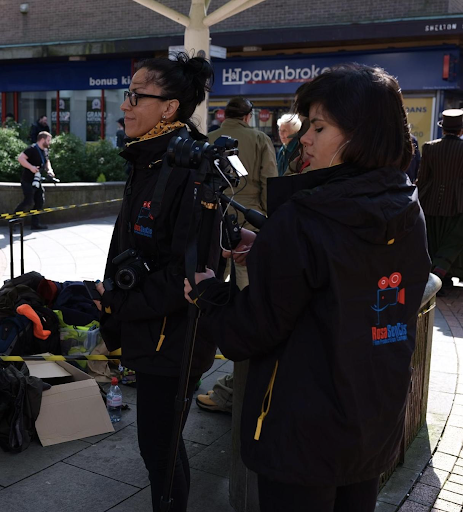 Rosa (left) Maria (right) 2018Can you introduce yourselves and your creative backgrounds?
Rosa (left) Maria (right) 2018Can you introduce yourselves and your creative backgrounds?
Rosa: My name is Rosa Cisneros and I am a dancer, artist, researcher and activist. I like to say that I wear many hats because my curiosity, desire for social justice and my creative nature sends me down many paths and I end up sitting at many different tables. I am a research-artist at Coventry University’s Centre for Dance Research (C-DaRE) but also an independent artist and dancer. I get to curate exhibitions, festivals, create films and also organise educational lecture-demonstrations that draw on my cultural background and also my dance training. I feel so fortunate that I can do the things I love while also fighting for a more just world.
Maria: I have been working as a freelancer for the last 2 years. Rosa and I met in 2017 while I was still at university. We have, since, developed a fruitful friendship and meaningful work relationship. We are a true team, and our work is so much more important because it mostly reflects community-based projects with an artistic activism focus. We make the underrepresented voices heard and bring to light the tradition and heritage for the wide world to see and appreciate.
Your film, Roma: Reuse, Recycle, Reimagine, is based on a project in the Roma community that involves children and families. Tell us about the project and how it came to be?
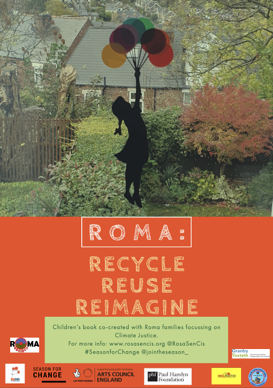 Official Poster for R: RRRR Credit: RosaSenCis FilmsRosa: In 2020-2021, I was awarded 1 of the 4 ArtsAdmin Seasons for Change commissions to create collaborative works centred around under-represented communities in the climate movement. Rosa directed and led Roma:Recycle-Reuse-Reimagine, a project that brought together Roma and non-Roma to work together to co-create a children's book that was shared with services, schools, artists and others who are not culturally aware and sensitive of the Roma communities.
Official Poster for R: RRRR Credit: RosaSenCis FilmsRosa: In 2020-2021, I was awarded 1 of the 4 ArtsAdmin Seasons for Change commissions to create collaborative works centred around under-represented communities in the climate movement. Rosa directed and led Roma:Recycle-Reuse-Reimagine, a project that brought together Roma and non-Roma to work together to co-create a children's book that was shared with services, schools, artists and others who are not culturally aware and sensitive of the Roma communities.
I was commissioned to co-create the book and lead on the project through co-producing a children’s book and using art and participatory methods to explore climate justice with vulnerable communities. Thanks to several individuals and organisations the book was devised and designed with the support of many grassroots Roma families located in 8 cities across the UK. The book was co-created during the several COVID-19 lockdowns. As part of the Seasons for Change Programme, I was taking classes to learn more about Climate Change and was keen to share her learning with the families. To support the process of going deeper into the topic, I worked with a local Roma woman and professional translator named Yassmin Stalislava and my right hand woman, Maria, to create materials that could be reused throughout and after the project. We knew going in that some of the Roma families involved were illiterate, therefore we created films with adults reading the children’s books in Romanes and Romanian.
Why do you think this project was important for the Roma community to take on?
Non-Roma people are used to viewing the Roma community through the stereotypical prism and negative attributions and Roma people are used to being viewed in this way. This is a vicious cycle that if not broken, will continue to bring misconceptions and [distort] reality. It isn’t fair and we all deserve to be seen and heard and not vilified or painted with a negative paintbrush. The Roma community is a colourful rainbow of people and realities and this deserves to be celebrated!
It was equally important for us to give the Roma community the channel they needed to have their diverse voices heard, as well as give the non-Roma audiences some examples of how great and rich the culture is and educate them in this direction.
The project and its various books, allowed the grassroots families the chance to learn, explore and decide how they feel about climate justice. We wanted to offer a safe and brave space to explore these serious issues but using arts and culture to do so. The books, the video books and the final documentaries present the various families on their terms and what feels great is that we could co-create fun and engaging materials that are also touching on important global topics.
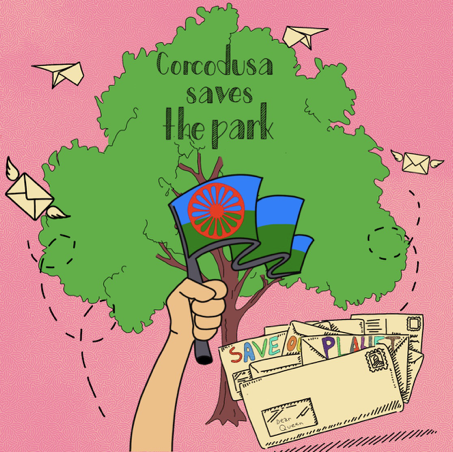 Cover of R:RRRR books Credit: RosaSenCis FilmsWhat was the reception to the film when it was first released?
Cover of R:RRRR books Credit: RosaSenCis FilmsWhat was the reception to the film when it was first released?
Well, they were so happy! The film continues to be screened, shared and presented nationally and internationally. When the film first premiered, the families were thrilled, proud and in disbelief to see and hear about the other families' contributions. There was excitement to see how others' voices were included and they were shocked to see themselves on the big screen or on YouTube. One child joked, “Rosa, I am now famous!”. Another young boy was proud to see his mummy on camera talking about “his” book.
For non-Roma, they were so impressed that we could co-create so many resources and also do all of this during the various lockdowns. The films, and the BSL version of the documentary, is another important message. As a film industry we need to consider making our work accessible to as many audiences as possible. RosaSenCis films embeds accessible and ethical ways of working in all of our projects. This particular Documentary with BSL was also sent to the Sheffield Children’s Hospital Audiology team as they have a high percentage of young Roma visiting their practice.
In watching R:RRR, the prime focus is getting children and families in the Roma community involved in sustainability and the environment. Why do you think it’s important for children to learn about this so young?
The living dynamic in the Roma families is now changing. Most of the Roma families we worked with have already lived in the UK for a good number of years now. When they first moved to the UK, their children were very young and some even have been born here. One of their well-known characteristics is adaptability, so it was a natural path for them to seek better living conditions and educate themselves on what they can do from their home to protect the environment.
In my opinion, any child, from any community should be taught from an early age the importance of recycling, taking care of the environment and protecting nature. It's our common responsibility to do so.
We all play a role in climate justice and we each have some responsibility and also can help direct and change the future. A friend of mine used to say " when you know better, you do better!" I am on my own journey of educating myself and am keen to share my knowledge with others and invite us all to not be passive. We each have a superpower and Corcodusa Saves the Park shows that we can all care about our environment but also need our policy makers to help us.
How did the children first respond to the idea of creating a book and how did it feel to see the children so happy about their ideas having come to life?
The children were a bit hesitant at the start and not sure I would really follow their lead on building the characters and developing their ideas. Including their parents and the older family members, was also surprising and very fun for everyone. My sense was that they thought I might change their drawings or omit some of the phrases, but when they saw it all come together and they were also listed as an author, they were so proud. Albi, the lead graphic designer for the book, found the right balance between his artistic vision and honouring the families’ artwork. For us, there were so many golden moments but seeing them glow with excitement and take the book to school for World Book Day, was definitely magical.
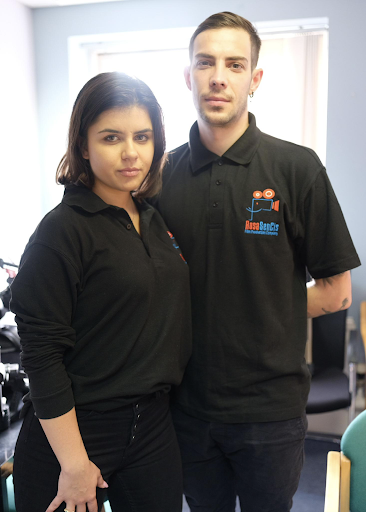 Maria (left), Albei, Lead Graphic Designer (right)Was there anything you saw, learned or discovered during filming that surprised you?
Maria (left), Albei, Lead Graphic Designer (right)Was there anything you saw, learned or discovered during filming that surprised you?
Over the years, I noticed how respectful everyone was towards each other in the community and outside as well. This didn't surprise me, but it strengthened the idea that the new generation is bringing so much knowledge and talent into the world already. The kids and the teenagers are so much more aware of their power and talents and are no longer hiding it anymore.
What did surprise me, us, was how we co-created and wrote this book during a global pandemic. And even though we had to honour distancing measures for the making of the documentary, it all came together. I suppose this speaks to the community's resilience and also our respect and willingness to deeply listen and follow the community's lead.
Some of the people in the film speak on the misconceptions of the Roma community, and this film almost acts as a response to that. What can non-Roma people do to support the Roma community in helping banish these misconceptions?
I would say the most important thing non-Roma people can do towards any community, not necessarily just Roma, is to listen, be open, understand and have patience. We all live in a multicultural space, so being different is always a win for any society. We all have the opportunity to learn from each other, develop new skills, and maybe make life-long friendships.
“The children are the voice of the Roma community” is a quote from the film. How can wider society support the children of the Roma community?
I believe that the children are the voice of any community and our message to the future. Each one of us is responsible to send a cleaner, richer and more meaningful message to the future and to reduce our footprint. Supporting our young people and allowing them into spaces that often exclude them, is one way society can support our babies. Another way is to simply try to get to know them. The R:RRR film highlights groups of Roma young people and documents them as they are… these are our future leaders and rather than knock them down, let’s lift them up so they can break through any glass ceilings they hit.
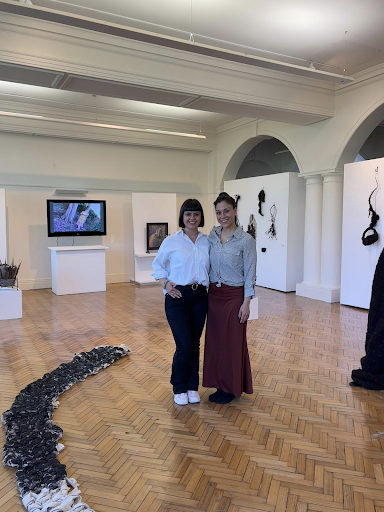 Rosa and Maria at opening of Gypsy Maker 5 ExhibitionCredit: RosaSenCis FilmsWhat do you hope this film can help achieve for the Roma community?
Rosa and Maria at opening of Gypsy Maker 5 ExhibitionCredit: RosaSenCis FilmsWhat do you hope this film can help achieve for the Roma community?
For audiences to see the diverse voices of the community and to see the families and young people as human. Not to label the people or to categorise them/us. Rather we hope to teach and show people that we are also contributing to society in a number of ways. Some of the traditions might be different or misunderstood, but often things people associate with our culture are just symptoms of poverty.
As an artist, I would like to acknowledge that we all have our blind spots and prejudices. It would be great if we didn't have these shortcomings, but rather than stay stuck and accept those prejudices, challenge yourself to reflect and see how you might be able to move past them. Education is powerful and films and creative spaces are great tools that facilitate transformation and we hope this film offers insight into the diverse Roma experience.
R:RRR is a really interesting display of Roma pride and identity. If you could wish anything for the future of the Roma community here in the UK, what would it be and why?
Love, kindness and reflection. I wish we could all do these a bit more and a bit better, everyday. Imagine if we all decided to be a bit more empathetic, patient and flexible and not so worried about consuming… we might actually be healthier and live in a more just world. Inclusion is a word that is overused by a number of people, institutions and schemes. We would personally like to see this applied more from the inside out through educating our children, families and close friends from our own communities, [that] would be a step forward. Things will only change if we all do our part in being more open towards each other. Roma and non-Roma have to do the work together and we each have a lot to learn from one another.
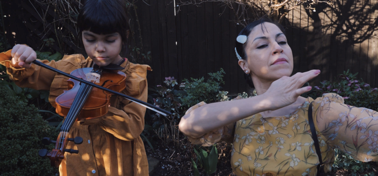 Rosa and Maria at opening of Gypsy Maker 5 ExhibitionCredit: RosaSenCis FilmsWhat’s next for you?
Rosa and Maria at opening of Gypsy Maker 5 ExhibitionCredit: RosaSenCis FilmsWhat’s next for you?
What's next? Hmmm, great question. Well, we will continue to make films together and ensure that our friendship flourishes. That friendship is what allows us to compliment each other so well both on camera and off.
As for projects, there is always a lot brewing. Currently thinking about part two and three of our LifeStrings screendance film. That film also explores climate justice and trauma but is more storytelling than documentary. Also thinking about a sequel to Corcodusa. What if Corcodusa dances in the park, or Corcodusa speaks at the next COP? Who knows, anything is possible. Would love it to happen but need the support to ensure I can honour everyone's time. We like to say that when you dream big, you might fall hard but sometimes, those dreams come true. We try not to be afraid to fail or ask a question. This keeps it fresh and allows us to keep growing and creating honest art and films.

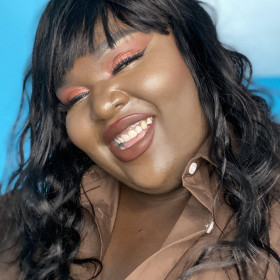
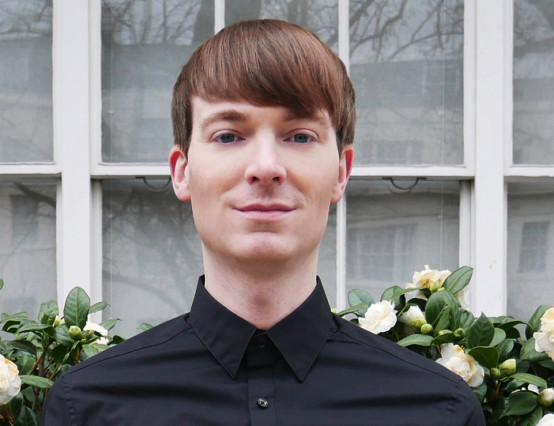
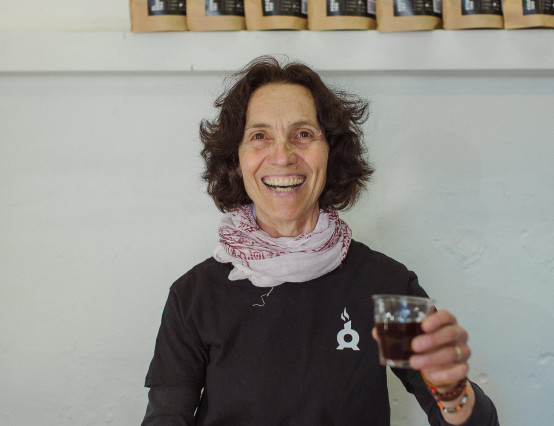
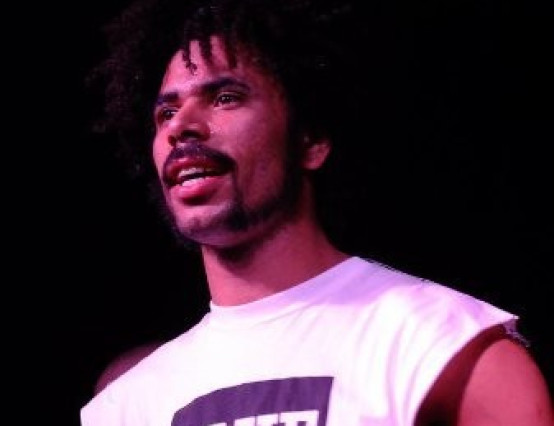
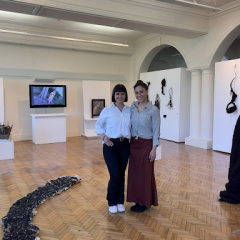


0 Comments